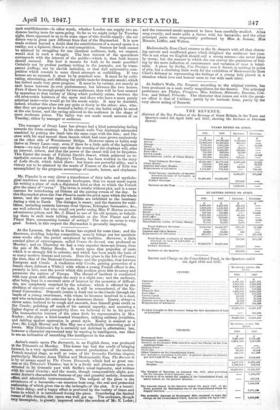At the Lyceum, the faith in Easter has expired for
some time; and the directress, avoiding holyday competition, usually brings out her spectacle some weeks after the period sanctioned by tradition. However, a little comical piece of extravagance, called Crusoe the Second, was produced on Monday; and on Thursday we had a very superior three-act drama, from the pen of Mr. Shirley Brooks. It turns upon that prejudice of caste which is so strongly felt in colonies, and which has been made the basis of so many modern dramas and novels. Here the place is the Isle of France; the time, that of the National Convention; and the prejudice, that between European and Creole. A vindictive wily Creole, gaining possession of a female slave, (almost a White,) with whom a young French officer is des- perately in love, uses the power which this position gives him to annoy and persecute the natives of Europe. The thread of incident is conducted with very great skill, although the story is a slight one; and the audience, after being kept in a constant state of interest by the accession of difficul- ties, are completely surprised by the solution; which is effected by the abolition of slavery-one of the acts, it will be remembered, of the Na- tional Convention. Dramatic justice is dealt out to the Creole through the hands of a young swordsman, with whom he becomes involved in a duel, and who terminates his existence by a dexterous thrust. Emery, always a clever actor, inclined to be rough and uncouth, does himself great credit as the Creole; polishing off much of his natural asperity, and assuming a higher degree of acute perceptivity than we believed to be in his power. The humanitarian interest of the piece finds its representative in Mrs. Keeley; who plays a kind-hearted vivandiere talking military jovialities, and rattling against oppression in grand style. Keeley is comical as a Jew; Mr. Leigh Murray and Miss May are a sufficiently interesting pair of lovers. Miss Dickinson's fop is certainly not deficient in affectation; but, however a character represented may be wanting in intelligence, one likes to see an indication of something like intelligence in the artist.


























 Previous page
Previous page